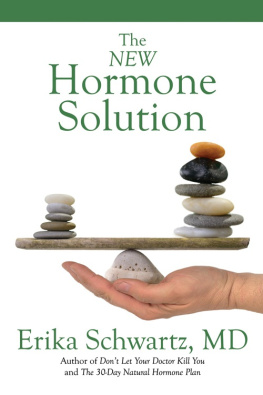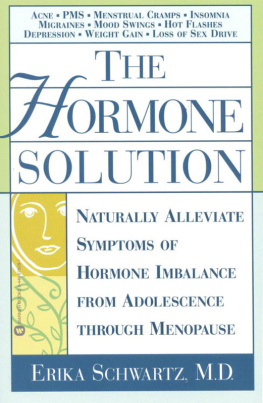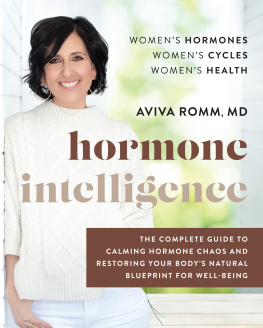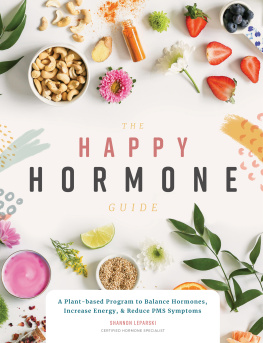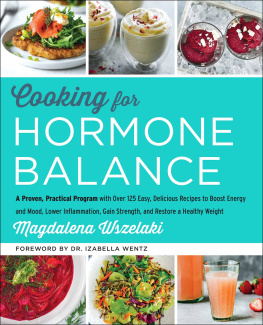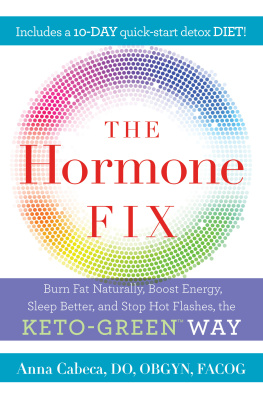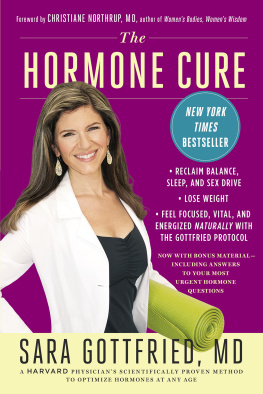A POST HILL PRESS BOOK
Published at Smashwords
The New Hormone Solution
2017 by Erika Schwartz, MD
All Rights Reserved
ISBN: 978-1-68261-330-6
ISBN (eBook): 978-1-68261-331-3
No part of this book may be reproduced, stored in a retrieval system, or transmitted by any means without the written permission of the author and publisher.
Photos by Gerardo Somozo
Interior Design and Composition by Greg Johnson/Textbook Perfect

Post Hill Press
posthillpress.com
Published in the United States of America
CHAPTER 5
Alternative Treatments for Symptoms of Hormone Imbalance
A lternative therapies have emerged over the course of the past two decades out of the publics dissatisfaction with the consistently poor performance of conventional/classical treatments. The classical medical system has boxed itself into only diagnosing and treating disease, is tightly bound to the FDA, and is totally dependent on medication usage rather than focusing on true prevention. Although attempts to change public perception have been made with a push for earlier diagnosis of disease with the help of mammography, colonoscopy, PAP smears, lipid profile measurement, bone density, and genetic testing, the obsession with diagnosing diseases has left conventional medicine unable to help people stay healthy. Conventional medicine is only useful for acute care and diagnosis of disease. Prevention and wellness are outside its scope.
What conventional medicine considers prevention, such as PAP smears, mammograms, colonoscopies, and cardiac stress tests, are methods of diagnosing diseases at earlier stages. Not one of these methods actually prevents diseases from occurring. Just take a moment and think about it. How do any of these tests prevent anything?
Desperately aware of the need to prevent disease, the public has been searching for different avenues to true prevention. As we live longer and strive for healthier lives, postponing and slowing the aging process is rapidly becoming a must for an ever-growing number of people. In fact, multibillion-dollar alternative, holistic, anti-aging, integrative, functional, complimentary, orthomolecular, functionalall names for preventive medicine specialtieshave sprouted and are highly successful and sought after. Premenopause, menopause, and andropause have fueled the anti-aging and preventive health industry. Billions of dollars are spent every year by people in search of alternative treatments.
While the alternative trend is booming, it behooves conventional doctors to stop downplaying the importance of alternative medicine, become knowledgeable in the options and thus stay true to the mission of helping the patients. Discarding information and modalities we have not been taught in school is not the way to help but rather to lose patients.
Medical training in the conventional world still discounts alternative options and discourages conventional doctors from seeking information. I had to do my own research and work with my patients to figure out how best to help them and myself. In the end, I became truly informed as I began to use alternative therapies in conjunction with conventional medicine in my practice with continuously improving and reassuring results. This chapter offers an overview of the alternative medicine world my patients and I have been using over the past two decades.
Before you try any of these remedies, I strongly suggest you seek real professional advice. Be careful and cautious about advice given by salespeople in health food stores, online advertising by marketers raving about the particular product they are selling, self-proclaimed gurus with no real training or experience, or media-savvy salespeople with the goal of making money off your fears and desperation. Stop falling prey to the hype of well marketed cure-all supplements. Just like with drugs, only seemingly less dangerous, you dont know what is in the capsule or tablet, you dont know what the effects of the promoted stuff will be, you dont know how they will interact with the medications youre taking. Pyramid schemes abound in the world of alternative medicine sobuyer beware. Find a caring physician interested in alternative therapies, go to a health care provider with experience and get the most knowledgeable help available.
Even though the products I write about in this chapter are available over-the-counter, they may not be as safe or as effective as we would like to believe they are. Remember, there is only one of you and every time you take a supplement or medication or food, you affect your entire bodys balance. One fatal mistake is all you can make. Unfortunately, there are no statistics to tell us how many people get into trouble because they take supplements and prescribed drugs, because most patients do not tell their doctors the truth about the supplements and vitamins or medications they are taking out of fear of being belittled or dismissed.
Government Regulation of Supplements and Herbs
Most supplements and herbs are not regulated by the Food and Drug Administration (FDA).
FDA approval is a very expensive process reserved for wealthy pharmaceutical companies. Having obtained FDA approval, drug companies can make certain claims about their medications that allow them to charge higher prices for their products. Unfortunately, FDA approval does not guarantee safety or efficacy. Its part of a dangerous game where the bottom line, not the patient, matters the most.
However, in spite of a neverending list of FDA-approved fiascos, most people and conventional physicians are oddly still more comfortable with FDA-approved drugs than herbals or supplements and vitamins. And the media reinforce this stance by consistently reporting any negative issues with alternative products while omitting problems with FDA approved drugs. This situation leads the public to believe that FDA-approved drugs are safer even if that is not quite so.
Before we move on to the non-FDA-approved alternative options, I would like you to know one more thing. While I am a conventional physician and prescribe FDA-approved drugs every day, I know the FDA doesnt approve any drug for long-term usage. The role of the FDA is to approve drugs for short-term usage based on scientific data provided by the manufacturer of the drug. Once a drug is approved by the FDA and reaches the market, it is the responsibility of the drug manufacturer to report to the FDA any untoward effects. The longer a drug is on the market and the more it is used, the more likely we are to find out its true safety and efficacy record. The caveat being that its the responsibility of the manufacturer to report problems. There is no oversight by the FDA and many drugs stay on the market longer then they should because if they make money there is little incentive for their manufacturer to report problems.
Thats why in my practice I prefer to use old drugs with established safety track records with millions of users over many decades. So the next time your doctor offers you the newest drug sample to treat your allergies, blood pressure, or diabetes, consider opting for an older drug and skip being a guinea pig in the pharmaceutical game. It will serve you better in the long run.
Alternative Therapies
Supplements and vitamins are not under FDA supervision. According to The Dietary Supplement Health and Education Act (DSHEA) of 1994 a dietary supplement is a product that contains a dietary/food source ingredient intended to supplement the diet. Dietary ingredients include vitamins, minerals, herbs or other botanicals, amino acids and substances such as enzymes, organ tissues, glandulars, and metabolites. Dietary supplements can also be extracts or concentrates, and may be found in many forms such as tablets, capsules, softgels, gelcaps, liquids, or powders.
Next page
